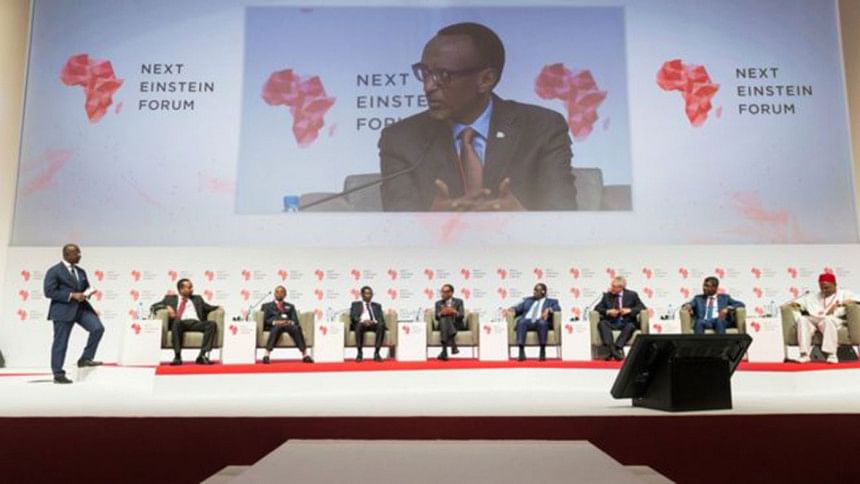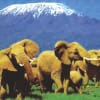‘Next Einstein’ might come from Africa

Back in 2008, South African physicist Neil Turok gave a speech in which he declared his wish that the next Einstein would be from Africa.
It was a rallying call for investment in maths and physics research in Africa. The "Next Einstein" slogan became a mission for the organisation Neil Turok had founded to bring Africa into the global scientific community: the African Institute of Mathematical Sciences (AIMS).
That search for an African Einstein now has some results, with 15 "Next Einstein Fellows" and 54 "Next Einstein Ambassadors" announced at an event last month.
These are young African scientists, often leaders in their fields, working and studying in Africa.
'REVOLUTIONARY AND FEARLESS'
"Einstein is a natural, easy role model for people to look at - not just because he was a spectacular scientist, but also he thought about the way we should care for social justice as well as science," says the 36-year-old South African cosmologist Amanda Weltman, speaking to the BBC Discovery programme.
Her work on the Chameleon field, a way to explain the accelerated expansion of the universe, is seen as a continuation of Einstein's work.
"Where Einstein triggered all these completely new ideas and brought about revolution, that's what we want to do. It's not necessarily to be that person, but to be revolutionary and fearless," Dr Weltman adds.
When Neil Turok made his declaration, he wasn't thinking so much of a literal African Einstein, but of creating opportunities to nurture young scientific leaders who would challenge the stereotypes of Africa and champion its development through science.
"There is a huge youth demographic in Africa and this will get bigger; 40% of the world's youth will be African by 2050," he says.
"Many scientists around the world are more than happy to come to Africa for a few weeks a year and share their knowledge and insights with the most able young Africans."
The apparent gap between studying maths or physics and Africa's needs - in public health and disease control, for example - might seem huge. But one branch of science can inform another.
CHANGING THINKING
Thierry Zomahoun, the CEO of AIMS, cites the example of the west African Ebola outbreak, where local work on mathematical modelling of the virus might have slowed the spread of the disease at an earlier stage.
"It's urgent for mathematical epidemiologists to be trained on the continent, for lab technicians to be trained so that we don't have to invest billions of dollars paying expatriate technicians from France or the US to do the work that we could have done here," he said.
Zomahoun is also the chair of the Next Einstein Forum - an AIMS initiative which held a gathering in March in Dakar, Senegal, both to celebrate the Next Einstein Fellows and to raise the political profile of the need for investment in scientific research in Africa.
Rwanda's President Paul Kagame was one of the speakers.
"We cannot be satisfied with just ending extreme poverty. Our aim is shared and sustainable prosperity and the key to that is science and innovation," he told the conference.
Foreign donors, especially former colonial powers, have played a big part historically in developing African education - particularly in science - but have also dictated what kind of research is done.
That model is changing, says Evelyn Gitau, adding that her Kenya-based research into cellular immunology and malaria is only possible because of large-scale funding and a hands-off approach from the UK's Wellcome Trust.
In order to own scientific progress, Dr Gitau says, African governments must get more involved.
"African governments have to change how they think. Travel grants are great, but $10 to $20,000 is not going to fund research at the cutting-edge level."
From the beginning, AIMS had a funding policy which compelled African governments to step up to the plate. Its institutes get half their funding from the governments of the countries in which they are based - South Africa, Tanzania, Ghana, Senegal, Cameroon - and the rest from foreign governments and private foundations.
New AIMS institutes are planned for Morocco and also Rwanda.
UNIQUE ADVANTAGES
Rwanda styles itself as the place to do business in Africa, making it easy to set up there, especially for entrepreneurs from other African countries.
It sits, however, in a region with a history of instability and autocratic government. That doesn't sound like a place for free-thinking scientists to thrive.
This is an issue Neil Turok is only too aware of.
"This does not mean we are an instrument of the Rwandan government. AIMS is all about freedom - it's about freedom to learn, freedom to express opinions... Science is all about critical thinking. Nothing we do will compromise that," he says.
"We feel by getting involved in Rwanda now, we can be on the side of progress."
Africa might seem an unlikely destination for high-end scientific research, but this is becoming a reality and the continent has some natural scientific advantages.
Amada Weltman cites the example of the Square Kilometre Array - the world's largest radio telescope, currently under construction. This "south south" project (the second section of it is in Australia) could not have been built in more densely industrialised countries, due to the amount of radio-wave pollution in their skies.
"We didn't get that project just because of some sort of sympathy towards Africa. We consider the night sky as a resource, where Africa is perhaps more empowered than the global north, which is already overly polluted with radio waves. So this gives us a fresh angle to how we think about the universe."
There are advantages in other fields, too. For scientists using bioinformatics to explore the origins of genetic disease, Africa holds a unique place as the cradle of humanity - and therefore the repository of our oldest genetic information.
The continent's future scientific development could have a profound impact on the future of mankind.

 For all latest news, follow The Daily Star's Google News channel.
For all latest news, follow The Daily Star's Google News channel. 








Comments